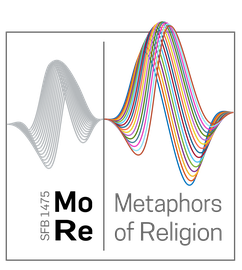Study Program & Curriculum
GSMR Study Program | Exemplary schedule

The GSMR’s study program builds upon RUB’s and CERES’ existing ECR support program, integrates general CRC events and adds formats specifically developed for the GSMR. Our structured program is designed in such a way that, if possible, everyone completes their dissertation within four years. In addition, GSMR ensures that its members have completed important key skills trainings and have thought of your future career path - whether in or outside of academia.
GSMR Curriculum (2022-2025/26)

[* 1 CP = 25 - 30 working hours]
After the successfull completion of the study program each candidate will receive a transcript of records and a certificate!
Research Colloquium
The research colloquium is a longstanding part of CERES' PhD program, featuring bi-weekly, two-hour sessions during the semester. Each session allows one ECR—whether a PhD candidate or early postdoc—to present their research or seek advice on challenges. This regular practice helps ECRs refine their presentation skills. Participation over one year earns PhD candidates three credit points (CPs).
Workshop on Methods
This one-day workshop, usually held during the semester break, focuses on specific methods relevant to the ECRs in the research network. Among other things, participants discuss theoretical texts and apply methods to sample material. Methods of academic work (such as dissertation writing, grant writing, publishing techniques, etc.) are also offered. The workshops are usually self-organized, with invited external experts. Participation in two workshops per year is recognized with one CP. Both GSMR postdocs and CERES ECRs can participate.
CRC 1475 Monday Meetings
Weekly plenary sessions for all CRC members, including ECRs and associated members, feature work-in-progress presentations, guest lectures, and debates. ECRs can suggest topics or organize sessions. Active participation over one year earns PhD candidates three CPs.
CRC 1475 Annual Meetings
Annual meetings gather all CRC members to discuss overarching issues and subproject progress. ECRs participate and can present alongside PIs. Each participation earns one CP. At the last two CRC annual meetings, the GSMR has held poster sessions.
Introductory Courses
During the term, the GSMR offers specialized introductory courses for ECRs, covering interdisciplinary topics such as Linguistic Approaches in the Study of Religion, Digital Humanities for Historians, Theories and Approaches in the Study of Religion, Metaphor: Linguistic and Literary Perspectives. These weekly courses help the GSMR members build a shared theoretical framework. Active participation earns three CPs per course, and RUB MA students may also attend.
GSMR Journal Clubs
ECRs form small groups each semester to discuss journal articles or book chapters, thereby increasing familiarity with current research and publishing practices. Each journal club group meets at least three times per semester and participants earn one CP.
Active Participation at External Conferences and Workshops
The GSMR supports ECRs attending international conferences to present their research. Active participation, such as giving a talk or poster presentation, helps ECRs develop presentation skills and publication strategies. Each conference participation earns three CPs.
Organization of Workshops
GSMR provides funds and support for ECRs to organize their own academic workshops on chosen topics, encouraging autonomy and individual career planning. Collaborative proposals are especially encouraged.
Key Skills Training
Early career researchers can select courses from RUB Research School and the GSMR's offerings, focusing on skills like academic writing, grant writing, and career planning. Participation in one course earns three CPs, and postdoc-specific trainings are also available.
Optional Subjects
PhD candidates have six CPs available for optional subjects, allowing them to tailor their curriculum according to their needs. They can choose additional activities like introductory courses, journal clubs, or conference participation to deepen their interdisciplinary and discipline-specific knowledge.
Additional Support
The GSMR offers additional support through regular co-writing sessions, designed to assist ECRs with their writing projects in a collaborative environment. Members can also receive feedback on their texts, presentations, and talks as needed.
Moreover, GSMR members have access to the coordination team and the GSMR board for ongoing advice and counseling, ensuring that ECRs receive the guidance they need throughout their academic journey. In addition, CERES also offers personalized support for funding strategies.

